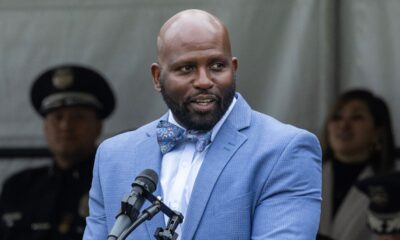Politics
Crisis in the Northwest: Fentanyl 'killing the mentally ill for a dollar a pill' in state with loose drug laws

This story is part of a series examining the drug and homeless crises plaguing Oregon. Read part one.
PORTLAND, Ore. – People sleeping — or passed out — in downtown Portland hardly get a second glance. Most pedestrians keep their eyes trained straight ahead as they walk past clouds of fentanyl smoke or slumped figures with lolling heads. Maybe they cross the street or look sidelong at someone who starts shouting or throwing things.
But Nikki is different.
A man sleeps in front of a business on Jan. 10, 2024, in Portland, Oregon. (Hannah Ray Lambert/Fox News Digital)
CRISIS IN THE NORTHWEST: ARE VOTERS ‘BEYOND A TURNING POINT’ AFTER DECADES OF PROGRESSIVE POLITICS?
“Are you okay? Are you sleeping?” she called out, approaching a cocooned form next to the light rail tracks. Somewhere inside the sleeping bag, a man grunted in response.
Nikki, who has been homeless for two and a half years, repeats this process any time she sees someone lying on the ground, making sure they’re responsive.
Fentanyl “literally makes people so careless that they will stand over someone who is dead or dying and continue to get high,” she said. It happened to one of her friends, a man in his mid-20s who appeared to be sleeping, but had died.
“They were gonna have a lot of life left,” she added.
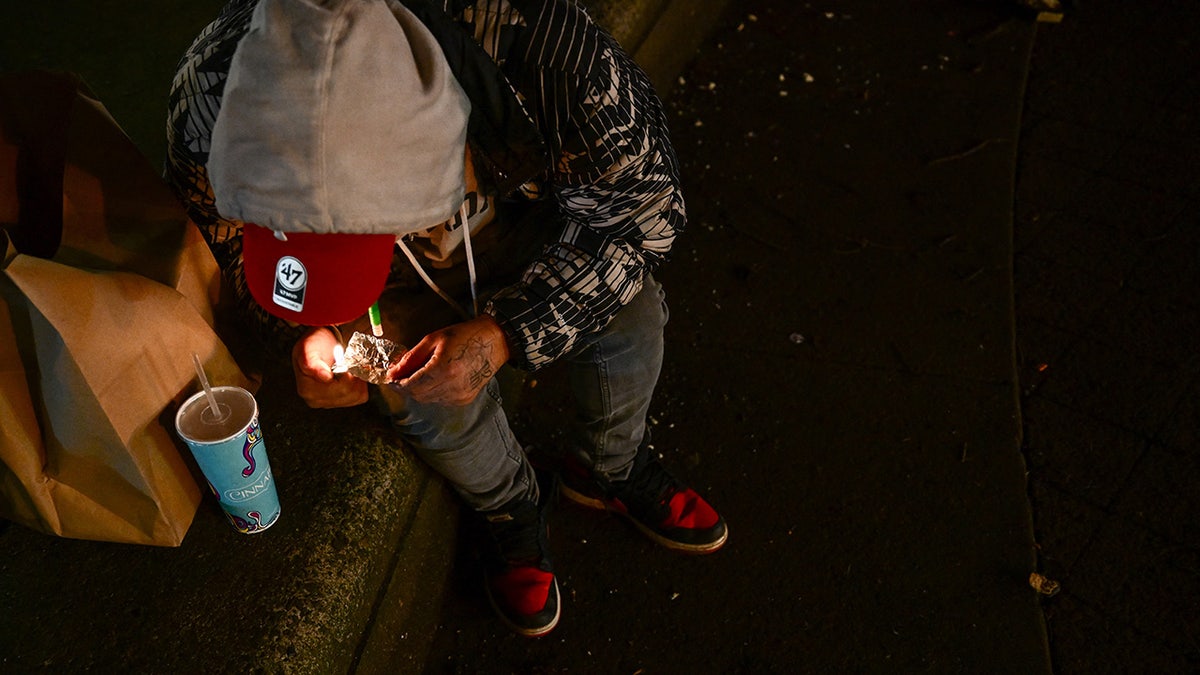
A person smokes a foil of fentanyl on Park Avenue in downtown Portland, Oregon on Jan. 23, 2024. Possession of user amounts of all drugs became decriminalized in the state in February 2021 after voters approved Measure 110. The first-in-the-nation law turned possession into a Class E violation, punishable by a $100 fine. Selling and manufacturing drugs remains illegal. (Patrick T. Fallon/AFP via Getty Images)
State of emergency
Oregon has turned into a battlefield in the war over drug policy since the state became the first to decriminalize drug possession. Nearly 60% of voters approved Measure 110 but, three years later, numerous polls suggest they regret that move. And no other states have followed Oregon’s lead, despite assurances from researchers and decriminalization advocates that the law is not responsible for increased addiction, overdoses and crime.
State lawmakers are poised to re-criminalize drug possession in a special legislative session that begins Monday, though Democrats and Republicans have drafted competing bills. And Oregon Gov. Tina Kotek declared a 90-day state of emergency this week in downtown Portland, where the fentanyl crisis has been most pronounced.
“Our country and our state have never seen a drug this deadly and addictive, and all are grappling with how to respond,” Kotek, a Democrat, said in a release. “We are all in this together.”
WATCH: FENTANYL ‘KILLING THE MENTALLY ILL FOR A DOLLAR A PILL’
WATCH MORE FOX NEWS DIGITAL ORIGINALS HERE
Fentanyl strikes fear among even longtime drug users.
“This is creating zombies,” Lori, a homeless woman in Portland, told Fox News last summer. “This sh– should be illegal because they’re killing the mentally ill for a dollar a pill, because I guarantee ya, all these people have some kind of mental illness.”
Michael Dusek, who uses marijuana and meth, agreed.
“They’re incoherent most of the time, they’re babbling about something to themselves quite loudly, like they can’t hear themselves,” said Dusek, who has been homeless off and on since 1992. “They’re like living dead.”
‘LET THIS SERVE AS A WARNING’: ANARCHISTS CLAIM RESPONSIBILITY FOR BURNING CAR OUTSIDE CITY LEADER’S HOME
Overdose deaths in the state surged from 800 in 2020 to 1,394 in 2022, according to data from the Centers for Disease Control and Prevention. The overwhelming majority of fatal overdoses are now attributed to fentanyl, according to Oregon health data.
“It seems like we got all of Oregon coming, just to pick up fentanyl now,” Dusek said of Portland.
Decriminalization advocates point out that fatal overdoses surged across the country beginning in early 2020, not just in Oregon. Many analysts attribute the spike to isolation and despair during the coronavirus pandemic.
Regardless, Nikki said she has revived 32 people in the past year, collecting as many doses of naloxone as she can from clinics, shelters and even places where citizens have “just nailed a box to a tree or to a wall and keep it stocked with Narcan.”
It seems like we got all of Oregon coming, just to pick up fentanyl now.
Most fentanyl users Fox News spoke to were difficult — if not impossible — to understand. One woman chattered breathlessly while absently sorting syringes inside her tent, one hand protected by a blue latex glove. A 27-year-old man muttered that he was originally from Idaho, then lived on the Yakama Indian Reservation before a family member dropped him off in Portland so he could “live homeless and do drugs.”
“Most of them are mentally ill, and the families don’t wanna take care of them,” Lori said. “Or they’re sick and old and their families don’t take care of ’em.”
The rise of fentanyl
Methamphetamine was historically Oregon’s drug of choice. But around 2018, law enforcement started to see a trickle of fentanyl, and then a surge, outpacing cocaine, heroin and meth. The small blue pills looked like Oxycodone and were filling the void left after states cracked down on opioid prescriptions.
And they were cheap to produce.
“It doesn’t take a whole lot of fentanyl to meet the supply side for particular users to give them the effects that they want,” said Chris Gibson, executive director of the Oregon-Idaho High Intensity Drug Trafficking Area (HIDTA).
The number of pills law enforcement seized soared from about 100,000 in 2019, to more than 3 million in 2022, according to HIDTA’s annual report. And while preliminary data from 2023 shows the increase in pill seizures slowing, powder seizures more than tripled last year. Police who participate in the HIDTA reported finding more than 180 kg (nearly 400 lbs) of fentanyl powder, Gibson said.
“When you start thinking about the fact that it’s estimated that two milligrams of fentanyl is a lethal dose to a new user, we start seeing the dangers of that,” Gibson said.
The ingredients to make fentanyl are typically shipped from China to Mexico, Gibson said, then the finished product makes its way up the I-5 corridor from border to border, fanning out along the way.
“Oregon can’t control the southern border, but we have Honduran cartel members all in our urban areas pushing deadly fentanyl,” Clackamas County Commissioner Ben West said. “We can’t control that. But that costs Oregonians lives and it causes a lot of criminality and despair.”
But Oregon can control its drug policies, West said, and “elections have consequences.”
The end of the decriminalization experiment?
Measure 110 made possession of user amounts of all drugs, including fentanyl, a Class E violation, punishable by a $100 fine that could be waived if the suspect called a hotline and completed a treatment assessment. But it quickly became apparent that drug users were not calling the hotline or paying the fine.
The other major part of the law — and one that many decriminalization critics want to keep — was redirecting a large chunk of the state’s marijuana tax revenue to pay for addiction services, theoretically improving access to treatment. But that rollout was beleaguered by bureaucratic flubs and a tight implementation timeline.
Oregon approved $264 million in grants for more than 200 service providers as of December, according to the most recent audit from the Secretary of State’s office, which found issues with oversight and noted it has been difficult to demonstrate the new law’s effectiveness.
Many Oregon voters feel duped.

Numerous surveys show Oregonians support re-criminalizing hard drugs and making treatment mandatory, not voluntary, in order to avoid jail time. (Ramiro Vargas/Fox News Digital)
“I voted for it because I thought it would reclassify drug crimes and allow people to get into treatment and then it would be treatment focused,” Kristin Olson, an attorney and host of the Rational in Portland podcast, previously told Fox News.
But the majority of users who take advantage of Measure 110 funds are accessing harm reduction supplies like clean needles, pipes and Naloxone. Residential treatment and detox centers were not prioritized in grant spending, raising alarm among some providers, according to a recent audit of the measure.
“In Oregon, it’s really easy to get high and really, really hard to get treatment,” West said. “You would think we would want to reverse that culturally.”
Providers that “required sobriety for housing or supportive employment” were more likely to have their grant applications denied for not being “in line” with the spirit of the law, the audit also found.
“There’s a lot of money that is being put into out of sight, out of mind programs,” said Matt Maceira, who suffered from addiction and frequent homelessness for 27 years. “The money’s wasted is what I’m saying.”
In Oregon, it’s really easy to get high and really, really hard to get treatment.
After getting sober, Maceira founded Be Bold Street Ministries, a Christ-centered nonprofit. Volunteers can often be found praying with those living in one of Oregon’s biggest encampments, just across the Wilamette River from the state capitol. They tell them about shelter and detox options and, on a cold Friday in January, helped a 28-year-old meth user call and register for treatment.
Maceira opposed Measure 110 from the start.
“The decriminalization of deadly, mind-altering substances — you know what that will never produce? Decreased crime, increased public safety and lives saved,” he said. “But that’s what was promised.”
He said drug use is rampant at the low-barrier shelters prioritized by Measure 110.
“People are dying in those places. I’ve done celebrations of life services for people that have overdosed at low-barrier shelters,” he said, adding that he would rather see providers require sobriety.

Matt Maceira hugs a friend Jan. 12, 2023, in the homeless encampment at Wallace Marine Park in Salem, Oregon. Maceira lived in the camp when he was homeless and now comes back to share the gospel and help those who are ready enter treatment for addiction. (Hannah Ray Lambert/Fox News Digital)
PORTLAND LEADERS FRUSTRATED, SAY CITY ALLOWED TO SET HARSHER RULES FOR CIGARETTES THAN FENTANYL: ‘IT’S INSANE’
“Letting people use methamphetamine, fentanyl and heroin or any other deadly substance is not compassionate,” he said. “Having a rule that says, ‘Hey, government money is paying for this, you can’t use drugs here,’ is a really loving message. Like, I actually care about you. I don’t want to see you be another statistic.”
Measure 110 a top priority in special legislative session
Democrats, who control both chambers of the state legislature, have signaled they want to make drug possession a Class C misdemeanor, the lowest crime classification available in the state. Their proposal offers numerous off-ramps for those caught with drugs to avoid charges.
Republicans, meanwhile, released a bill that would make possession of drugs like fentanyl, heroin and meth a Class A misdemeanor and would require treatment to avoid jail. If convicted, drug users could face up to a year behind bars, a $6,250 fine, or both. They argue the stiffer penalties are necessary to incentivize people to get clean.
Lawmakers will meet for a short session beginning Feb. 5. It’s not clear whether the sides can compromise.
“We’re not looking to put a Band-Aid on something,” GOP Rep. Lucetta Elmer said. “We’re looking to actually see effective change.”
Elmer is particularly passionate about addressing youth addiction.
“A tragedy that came out of Measure 110 is that there was no differentiation between youth and adults,” she said. “If a youth is caught with alcohol, they actually would get a minor in possession charge. But if that same youth is caught with fentanyl, under Measure 110, that’s decriminalized.”
Danielle Bethell, president of the Association of Oregon Counties, said she doesn’t know any county commissioners who favor locking up drug addicts.
“That’s just not the narrative,” Bethell said. “The reality, though, is that everybody who has an addiction needs help. And most of them, if not all, need a nudge. And that nudge doesn’t exist anymore.”
‘THIS IS THE WILD WEST’: LONG POLICE WAIT TIMES IN MAJOR CITIES LEAVE VICTIMS FEELING HELPLESS
Yamhill County Sheriff Sam Elliott said his rural community had a “very successful drug court program” that helped people recover from addiction and avoid a felony conviction. Now, that’s essentially nonexistent.
“When you give them a violation citation that they don’t have to appear on … they don’t come back in and have that interaction with those resources,” he said.
Decriminalization advocates don’t want change, though, arguing the law is “doing its part to address drug use and addiction with a health approach,” according to the George Soros-backed Drug Policy Alliance, which poured millions into the campaign for Measure 110.
“Our opponents are using it as a scapegoat for other, longstanding issues such as homelessness, crime, and public disorder,” the group’s website reads. The alliance did not respond to multiple interview requests.
Researchers at New York University’s Grossman School of Medicine wrote in a September paper that they found no evidence of an association between decriminalization and fatal overdose rates in Oregon.
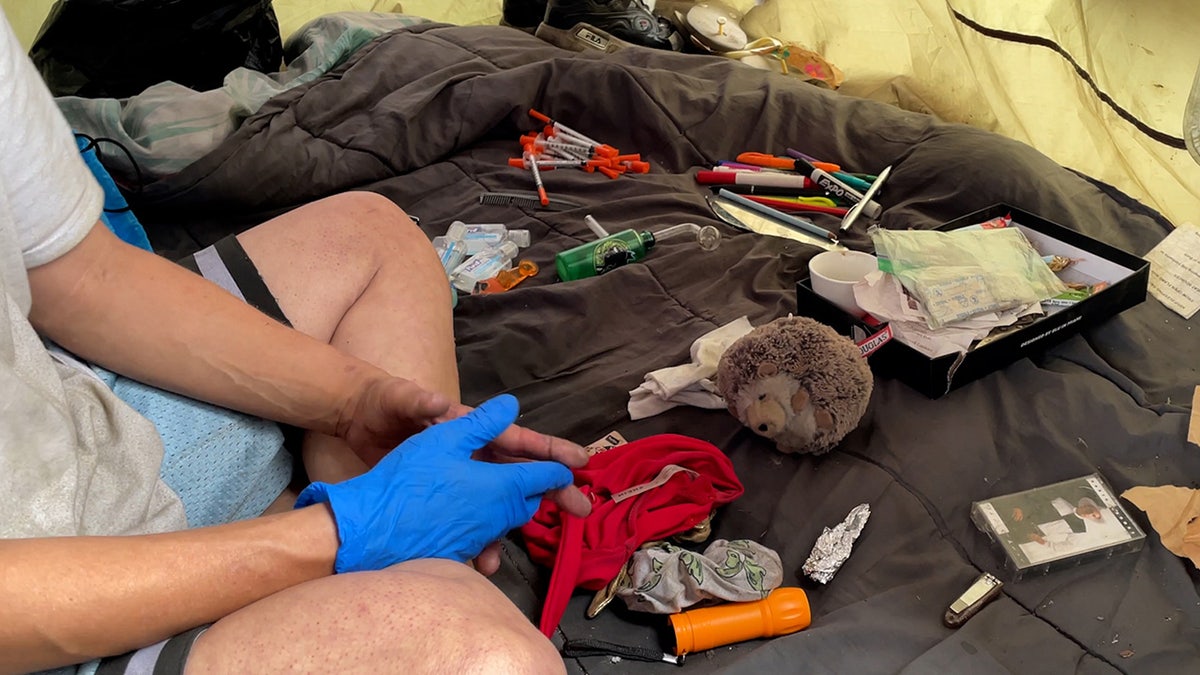
A woman sits inside her tent filled with syringes, a pipe, foil and other drug paraphernalia in Portland, Oregon, in July 2023. (Hannah Ray Lambert/Fox News Digital)
Gibson with the HIDTA and Elliott both said it’s difficult to attribute fentanyl’s rise in Oregon to Measure 110. The law took effect during the coronavirus pandemic, when overdose rates rose nationwide. And fentanyl has been ravaging east coast communities like Philadelphia’s notorious Kensington neighborhood for nearly a decade.
But Oregonians and their representatives seem unwilling to continue the experiment.
“I really think there is an opportunity to completely course correct,” Maceira said, by “not allowing people to use those deadly substances or be okay with it.”
Ramiro Vargas contributed to the accompanying video.

Politics
Opinion: If Martin Luther King Jr. were alive, how would he have approached the Trump era?

Unlike the many people who are upset that Donald Trump is being inaugurated on Martin Luther King Jr. Day, I see it as a good thing. First, it calls even more attention to the day and its significance. Second, it is a chance to speculate about what King might say and do if he were alive in the Trump era.
Counterfactual, “what if” history is a trend in the literary world. Trump’s inauguration on the holiday may prompt us to think about what America and the world might have looked like with King alive and well. Conversely, how did America and the world devolve without him?
King was the kind of leader who comes along once in a lifetime, one with unmatched eloquence and passion. His gift for oratory could energize all kinds of people, including workers, presidents and other heads of state. He possessed visionary insight on the complex racial, social and economic ills as well as their solutions and consequences.
He worked tirelessly to build a grassroots civil rights and social justice movement and serve as its guiding force. And his charismatic presence influenced people to act on the issues and problems he was working to solve.
How might that play out in the Trump era? To begin with, King abhorred all violence. He most likely would have been deeply pained by the mass gun killings that have become somewhat commonplace in American cities. He would almost certainly have butted heads with the National Rifle Assn. and its ardent backer Trump while lobbying Congress to pass comprehensive gun control legislation.
When it comes to international politics, King surely would have condemned Russia’s war in Ukraine. One can also envision him speaking out against Hamas’ kidnapping and slaughter of Israelis as well as Israel’s killing of Palestinian civilians. He would have called these wars ineffectual, repressive and wasteful, a drain on resources that should go to programs that aid the poor and minorities. On this point, he and Trump, who repeatedly claims he has kept America out of wasteful wars, would likely be in some agreement.
It’s impossible to imagine King not fighting tooth and nail against the rash of voter suppression laws and the GOP’s ploys to dilute Black and minority voting strength, including the assault on the Voting Rights Act. He’d bump heads with Trump on that. But Trump would also have a comeback: He’d cite the sharp increase in Black and Hispanic votes for him in the recent presidential election.
King would almost certainly try to prevent the country’s Republican-led rightward sprint, drawing negative attention from Trump and his MAGA coalition. But even he would not have been able to stop the many powerful forces with vested interest in halting or reversing the country’s momentum toward expanded civil rights, labor protections and economic fairness.
The resurgence of overtly racist sentiments, acts and conflicts under Trump would obviously trouble King, who famously hoped for a day when Americans are judged “not by the color of their skin but by the content of their character.”
King would have had to find new ways to challenge the continuing ills of poverty and wealth inequality, which ballooned in the decades after his death. Even given his superb organizing and planning skills, this growth likely would have been a losing battle.
Had he lived, King’s unshakable commitment to the cause of human rights and economic equality surely would not have diminished. Wherever there was a campaign, march, rally, lobbying effort or event that his presence could boost, it’s a safe bet that he’d have much to say and do. In the Trump era, there would be plenty to keep him busy.
Earl Ofari Hutchinson’s latest book is “Day 1 The Trump Reign.” His commentaries can be found at thehutchinsonreport.net.
Politics
Who Is Coming to the Inauguration — and Who Isn’t
Three of the richest men in the world, foreign dignitaries, tech and business executives, former presidents and an assortment of performers and other celebrities are on the guest list for President-elect Donald J. Trump’s inauguration on Monday, even as much of the midday ceremony has been moved indoors amid forecasts of extreme cold.
It is unclear what impact, if any, the relocation of Mr. Trump’s second swearing-in ceremony into the Capitol Rotunda will have on the seating arrangements. Unlike the outdoor venue, the Capitol Rotunda only seats about 600 people.
Four years ago, Mr. Trump skipped President Biden’s inauguration in a snub to his political rival. Every living former president is set to witness his return to power, but some prominent Democrats are opting out.
Here’s the list of those who are planning to attend the inauguration, and notable no-shows.
Going
Billionaires, businessmen and tech executives
Elon Musk, Mark Zuckerberg and Jeff Bezos, three of the world’s wealthiest men, were reported to be among the major tech executives who would sit in a position of honor on the dais at Mr. Trump’s inauguration — before the event was moved indoors. Tim Cook, the chief executive of Apple, and Shou Chew, the chief executive of the imperiled social media app TikTok, had also been invited to sit on the dais.
Seating for other high-dollar donors from the business world was already highly competitive even before the last-minute move indoors. Some offered donations to Mr. Trump’s inaugural committee as high as $1 million without receiving any access to the inauguration or accompanying receptions in return.
World leaders
China’s vice president, Han Zheng, will attend the inauguration on behalf of Xi Jinping, whom Mr. Trump had invited to the inauguration.
Unlike at the inaugurations of President Biden and former President Barack Obama, a number of other world leaders will be in attendance. Many of them share Mr. Trump’s ideology and policy preferences.
From Latin America, Javier Milei, the right-wing populist president of Argentina, is reportedly planning to make an appearance. Jair Bolsonaro, the former president of Brazil and another right-wing populist, had intended to attend, but his passport was previously seized by federal police in Brazil and his request to a Brazilian Supreme Court justice to make the trip was denied.
From Europe, Giorgia Meloni, the right-wing prime minister of Italy, affirmed that she planned to attend. The press secretary of Viktor Orban, the prime minister of Hungary who has a friendly rapport with Mr. Trump, told a Hungarian media outlet that the prime minister had received an invitation but would not be attending.
Three representatives from key U.S. allies in the Asia-Pacific region will also be attending: S. Jaishankar, the external affairs minister for India; Penny Wong, the foreign minister of Australia; and Takeshi Iwaya, the foreign minister of Japan.
Trump’s presidential predecessors
Mr. Obama, George W. Bush and Bill Clinton will all attend Mr. Trump’s inauguration — as they did his first inauguration, eight years ago. They will not, however, attend a traditional lunch with the president-elect on that day, according to NBC News.
Former Vice President Mike Pence is also planning to attend the inauguration, according to two people with knowledge of the planning. He received an invitation, as is the custom for all former presidents and vice presidents.
Celebrity invitees
Carrie Underwood will sing “America the Beautiful” at Mr. Trump’s inauguration, according to a program of events. Victor Willis, the last surviving founding member of the Village People — whose music Mr. Trump frequently plays at this political rallies — announced on Facebook on Monday that the group had accepted an invitation to participate in Mr. Trump’s inaugural activities.
NBC News also reported that several athletes and musicians would be in attendance: They include Antonio Brown, the football player; Mike Tyson, the boxer; Jorge Masvidal, the martial arts fighter; and Evander Kane, the hockey player. The musicians Anuel AA, Justin Quiles, Rod Wave, Kodak Black and Fivio Foreign will also attend, NBC said.
Not Going
Michelle Obama
Mr. Obama is scheduled to attend, but Michelle Obama, the former first lady, will not. A statement from Mrs. Obama’s office did not specify a reason for the scheduled absence but noted that she had not attended another event this month: She did not accompany her husband to the funeral of former President Jimmy Carter, which every other living former president and first lady attended.
Nancy Pelosi
Representative Nancy Pelosi, the former speaker of the House and a chief antagonist of Mr. Trump during his first term in office, will also skip the inauguration. Ms. Pelosi, 84, is still recovering from a hip replacement after falling while on an official trip to Luxembourg, but she has been attending votes in the House. A spokesman would not specify why she would not attend, but there is long-running acrimony between Mr. Trump and Ms. Pelosi.
A number of House Democrats are also skipping the inauguration
Democratic members of Congress who have announced or told reporters of their plans to skip the inauguration include: Representative Adam Smith of Washington, Representative Judy Chu of California, Representative Delia Ramirez of Illinois, Representative Donald S. Beyer Jr. of Virginia, Representative Steve Cohen of Tennessee, Representative Jasmine Crockett of Texas, Representative Ilhan Omar of Minnesota and Representative Veronica Escobar of Texas.
Politics
Trump wants to visit China again after he takes office: report
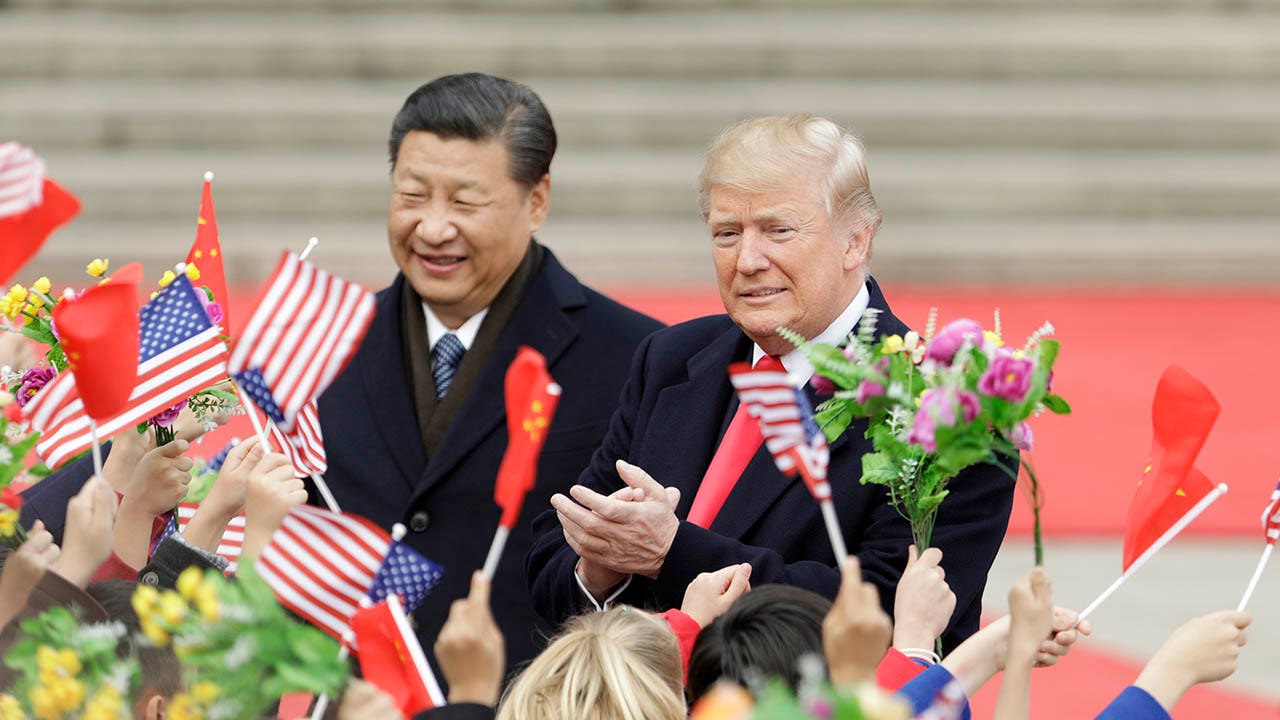
President-elect Trump is discussing the possibility of visiting China again as president with aides, according to a report.
The incoming president, who takes office on Monday, visited Beijing during his first term in 2017, and spoke to Chinese President Xi Jinping over the phone on Friday.
Trump has been threatening China with tariffs but has told advisers that he wants to strengthen ties with the communist country with the visit, possibly even traveling there within his first 100 days in office, the Wall Street Journal reported, citing sources familiar with the matter.
“I just spoke to Chairman Xi Jinping of China. The call was a very good one for both China and the U.S.A.,” Trump wrote on Friday on Truth Social. “It is my expectation that we will solve many problems together, and starting immediately. We discussed balancing Trade, Fentanyl, TikTok, and many other subjects. President Xi and I will do everything possible to make the World more peaceful and safe!”
HOUSE DEMS THREATEN TO BLOCK TRUMP’S BIG TARIFF PLANS: ‘UNACCEPTABLE’
President-elect Trump is discussing the possibility of visiting China again as president with aides, according to WSJ report. (Qilai Shen/Bloomberg via Getty Images)
He didn’t say if they had spoken about a visit.
Fox News Digital has reached out to the Trump transition team for comment.
It is also possible Xi could come to the White House for a visit, the Journal reported.
TRUMP LEAVES CHINA GUESSING WHAT HIS NEXT MOVE IS WITH UNUSUAL INAUGURATION INVITATION
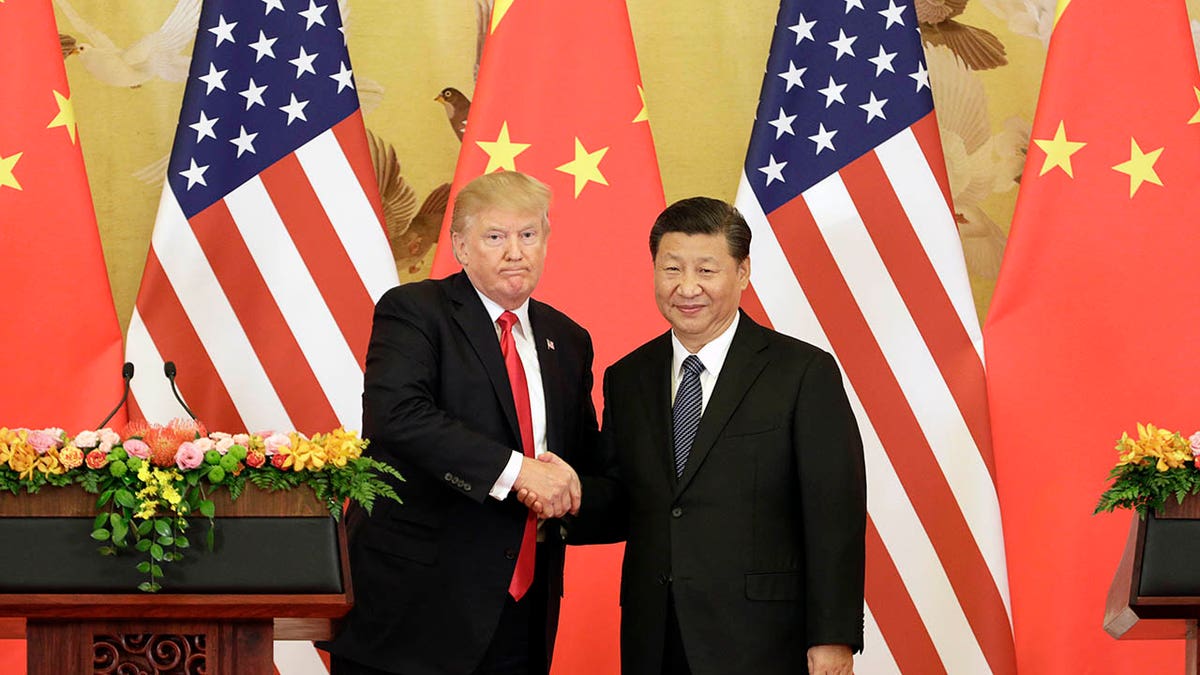
Then-President Trump shakes hands with Chinese President Xi Jinping at the Great Hall of the People in Beijing, China, Nov. 9, 2017. (Qilai Shen/Bloomberg via Getty Images)
Xi also met with Trump at Mar-a-Lago in Florida in 2017.
Xi was invited to Trump’s Monday inauguration – no senior Chinese official has ever attended a U.S. presidential inauguration – but Chinese Vice President Han Zheng will be attending instead, in a first.
Trump and Xi plan to establish a strategic communication channel, China said of their Friday phone call, adding that Trump said he was “looking forward to meeting with President Xi as soon as possible.”
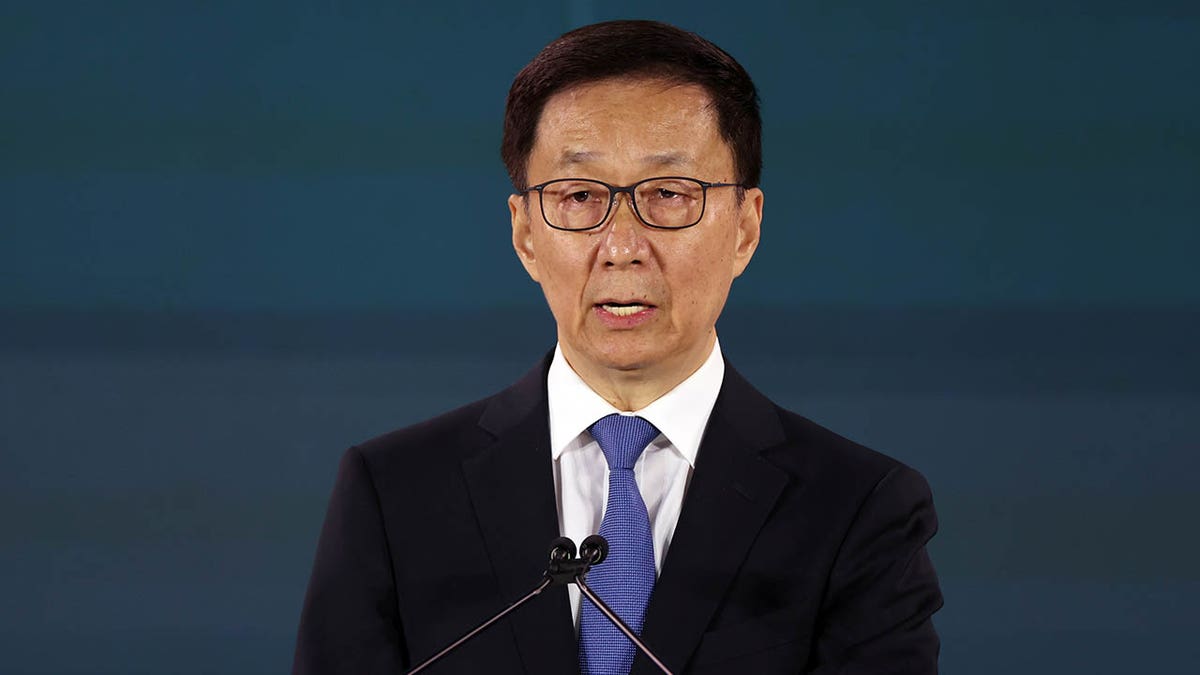
Chinese Vice President Han Zheng will attend Trump’s inauguration. ( Lionel Ng/Bloomberg via Getty Images)
Trump has also mentioned the possibility of going to India to aides, the Journal reported.
-
/cdn.vox-cdn.com/uploads/chorus_asset/file/25822586/STK169_ZUCKERBERG_MAGA_STKS491_CVIRGINIA_A.jpg)
/cdn.vox-cdn.com/uploads/chorus_asset/file/25822586/STK169_ZUCKERBERG_MAGA_STKS491_CVIRGINIA_A.jpg) Technology1 week ago
Technology1 week agoMeta is highlighting a splintering global approach to online speech
-

 Science1 week ago
Science1 week agoMetro will offer free rides in L.A. through Sunday due to fires
-
/cdn.vox-cdn.com/uploads/chorus_asset/file/23935558/acastro_STK103__01.jpg)
/cdn.vox-cdn.com/uploads/chorus_asset/file/23935558/acastro_STK103__01.jpg) Technology1 week ago
Technology1 week agoAmazon Prime will shut down its clothing try-on program
-

 News1 week ago
News1 week agoMapping the Damage From the Palisades Fire
-
/cdn.vox-cdn.com/uploads/chorus_asset/file/25826211/lorealcellbioprint.jpg)
/cdn.vox-cdn.com/uploads/chorus_asset/file/25826211/lorealcellbioprint.jpg) Technology7 days ago
Technology7 days agoL’Oréal’s new skincare gadget told me I should try retinol
-
/cdn.vox-cdn.com/uploads/chorus_asset/file/25832751/2192581677.jpg)
/cdn.vox-cdn.com/uploads/chorus_asset/file/25832751/2192581677.jpg) Technology4 days ago
Technology4 days agoSuper Bowl LIX will stream for free on Tubi
-

 Business5 days ago
Business5 days agoWhy TikTok Users Are Downloading ‘Red Note,’ the Chinese App
-
/cdn.vox-cdn.com/uploads/chorus_asset/file/25835602/Switch_DonkeyKongCountryReturnsHD_scrn_19.png)
/cdn.vox-cdn.com/uploads/chorus_asset/file/25835602/Switch_DonkeyKongCountryReturnsHD_scrn_19.png) Technology2 days ago
Technology2 days agoNintendo omits original Donkey Kong Country Returns team from the remaster’s credits




